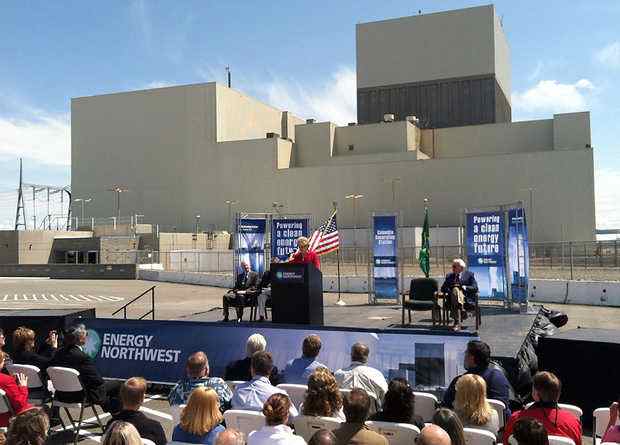forum
library
tutorial
contact

Columbia Generating Station
License Renewal Celebrated, Hated
by Annette Cary
Tri-City Herald, May 25, 2012
|
the film forum library tutorial contact |

|
Columbia Generating Station
by Annette Cary
|
 Chris Gregoire was asked when she became governor of Washington almost eight years ago if she would object to relicensing the Northwest's only commercially operated nuclear power plant to operate until 2043.
Chris Gregoire was asked when she became governor of Washington almost eight years ago if she would object to relicensing the Northwest's only commercially operated nuclear power plant to operate until 2043.
Her answer then is the same as it is today, she told about 450 Energy Northwest workers who gathered Thursday at the nuclear power plant near Richland to celebrate approval this week of a 20-year license extension.
The plant's energy is critical to the Northwest, and it provides a steady baseload of power through the seasons and without greenhouse gas emissions, she said.
"Congratulations," she said. "This is a great day."
The license renewal confirms the federal government believes the Columbia Generating Station is safe, she said.
However, as she spoke to almost half of Energy Northwest's 1,100 employees, five members of the newly formed No Nukes Northwest protested outside the gates of the nuclear power plant.
The goal of the group, formed as an off-shoot of Occupy Portland, is to get the plant shut down, said Miriam German, who painted her face and dressed as a "geisha of death" as a reminder of last year's nuclear disaster in Fukushima, Japan.
The Columbia Generation Station was first licensed in 1983 for 40 years.
Inside the gates, Steve Wright, administrator of the Bonneville Power Administration, which markets the power produced at the plant, said it is "an extremely important and valuable asset for the long term."
The plant provides almost 10 percent of all power generated in Washington, and remains an integral part of the power supply for Washington, Oregon, Montana and Idaho, Wright said.
The license renewal was not an easy test, but with the plant's future now defined, the plant will need to continue its substantial effort to improve performance, he said.
"We all want Columbia's performance to be elevated to a level admired by plants across the world," Wright said, drawing applause from workers.
The plant operated 505 days before a refueling outage last year, and it would have operated longer, except BPA asked it to power down because of too much river water for hydropower, said Sid Morrison, executive board chairman for Energy Northwest.
Energy Northwest employees worked on the license renewal for the past five years, said Mark Reddemann, Energy Northwest chief executive.
Desiree Wolfgramm, a systems engineer, said that even though there was a dedicated license renewal team at the plant, many more employees also worked on the effort as an added duty to their normal jobs.
They made sure structures could handle another 20 years by looking at maintenance and the present condition of systems, and employees also developed new aging management programs, said Wolfgramm and reactor engineer Scott O'Connor.
The renewal "means I have a job through retirement," Wolfgramm said.
The plant provides stable, professional jobs that pay a good wage, which is good for the Tri-Cities' economy, O'Connor said.
Sen. Patty Murray, D-Wash., and Rep. Doc Hastings, R-Wash., could not attend the event, but they sent videotaped messages.
Expanding nuclear energy production in the Tri-Cities by any technology, including small modular reactors being developed, means more reliable power, Hastings said. The Tri-Cities has the experienced work force and leadership to allow the state to become a leader in clean and job-creating nuclear energy fields, he said.
Small modular reactors could be a means to produce power to allow Hanford's massive waste vitrification plant to be self-sufficient and not rely on the same power sources as ratepayers when it begins operating, Gregoire said.
If small modular reactors are tested, the Tri-City area has shown it is a place of safe nuclear production, Gregoire said during a brief news conference before taking her first tour of the Columbia Generating Station.
Protesters have argued that a recent deal with the Department of Energy to have some of its stock of depleted uranium enriched for use in Energy Northwest fuel contradicts claims that the energy the plant produces is clean. The process uses power that protesters say will come, at least in part, from coal-fired plants.
Energy Northwest officials "fail to include the costs of the nuclear fuel chain from mining to processing," Sierra Club volunteer Leslie March said in a statement.
In actual production, Columbia emits no carbon, Reddemann said. It's no different than wind turbines made from metal manufactured in a process that generated carbon, he said.
Protesters carried signs that read "No nukes are the only good ones" and "Death is the nuclear discussion."
Veterans for Peace flew an American flag upside down.
The protesters from No Nukes Northwest joined a coalition of groups including the Alliance for Democracy, the Oregon and Washington Chapters of Physicians for Social Responsibility and the National No Nukes Activist Team of the Sierra Club in questioning how the license could be extended without regard to the nuclear disaster at Fukushima, according to a news release.
learn more on topics covered in the film
see the video
read the script
learn the songs
discussion forum
